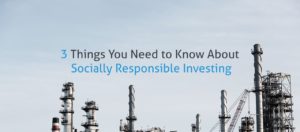
What is Socially Responsible Investing?
As the planet heats up so does the topic of Socially Responsible Investing. The events of 2020 have made it easy to forget we were already facing a worldwide threat before COVID-19. Global warming. And while the environment is not the only issue that Socially Responsible Investing helps address, it’s a major drive to consider this investment philosophy for many firms and their clients.
It’s not mainstream yet, but it is becoming more talked about. And with chatter around SRI and other “ethical” investment types on the rise, things can get confusing. This blog helps make simple sense of three key types of “ethical” investing – which will be crucial when considering if any of them are right for your financial future.
Introducing ESG, SRI & II.
Acronyms. Making life simpler for ‘those in the know’ and confusing for everyone else since IDK when. Luckily, our team are very much in the know, and after this you will be too.
What are ESG, SRI, and II?
In short, they are three distinct types of ethical investment philosophy. ESG stands for Environmental, Social & Governance, SRI stands for Socially Responsible Investing, and II stands for Impact Investing.
What’s the difference?
If you read those names and thought, “they all sound like they could be the same thing”, you’re not alone. Many people, both professionals and their clients, have slipped into using these terms interchangeably. But muddled usage can be dangerously misleading.
Confusion around these types of ethical investing could lead to you not getting the investment portfolio you intended or believe in. Don’t worry though. We’ve laid out the key differences between ESG, SRI and II below. So you can make the right choice on a personal level, and get exactly what you expect in terms of your investments.

Environmental, Social & Governance Investing
While the name Environmental, Social & Governance might sound like your investment decisions will all be based on green energy sources and human rights, the reality is quite different.
The priority of ESG is still very much to maximise financial gain for investors, but decisions consider how the environmental, social and governance practices of a business or investment could impact performance.
ESG factors are used to enhance traditional financial analysis, helping assess risk and opportunity on a deeper level than technical valuations alone. Some see this as a level of social consciousness, but decisions are ultimately based on financial opportunity.

Socially Responsible Investing
Socially Responsible Investing (SRI) goes further than Environmental, Social & Governance. While ESG judges the appeal of an investment with some ethical shades of grey, SRI is more black and white.
SRI involves selecting investments based on a set of ethical guidelines, while actively avoiding any opportunities that do not fall within them.
At Lomond Wealth, what those ethical guidelines include is up to you. Many SRI clients consider religion, values, and political views when making their decisions. These are very personal areas, but we are happy to support your decision-making, without bias, if you would like us to. Common focus areas of SRI guidelines include:
– Alcohol, tobacco and other addictive substances
– Gambling
– Production of weapons and defence tools
– Terrorism affiliations
– Human rights and labour violations
– Environmental damage
The flexibility of SRI allows you to draw your personal line in the sand. This arguably makes Socially Responsible Investing the best option to secure an investment portfolio you feel 100% comfortable with, both financially and ethically.

Impact Investing
The aim of Impact Investing is to invest in a way that will somehow benefit society or the environment. While Socially Responsible Investing ensures you avoid investing in businesses or sectors you feel will do further damage, Impact Investing seeks out investments that will actively ‘do good’.
If Greta Thunberg has started her pension planning already, it probably involves Impact Investing. But that’s not to say it’s not right for you too. Impact Investing isn’t only for the parents of ‘Fridays for Future’ kids or financially savvy Extinction Rebellion activists.
For most, Impact Investing offers all the opportunities needed to reach your retirement goals. Will you pass on investments that could have made you even wealthier along the way? Probably, yes. Will you be able to travel to see rainforests, ice caps, and coral reefs when you retire, knowing you did your best to protect the habitats, people and cultures you experience along the way? Absolutely.
Food for thought perhaps. And no need to chain yourself to a tree.
Is Socially Responsible Investing right for you?
Our aim here isn’t to tell you to invest in a certain way. It’s simply to make sense of some of the key terms behind these new investing pathways. Hopefully you’ll already have a better understanding of the emerging routes available to you, and maybe even a feeling of which level of ethical and social consideration is right for your financial decision making.
Want to see what the future of could be like for you and the world you live in?
Get in touch and let’s explore at the possibilities together. Our Socially Responsible Investing specialist, Craig Aitken, will be happy to answer any questions you have.
